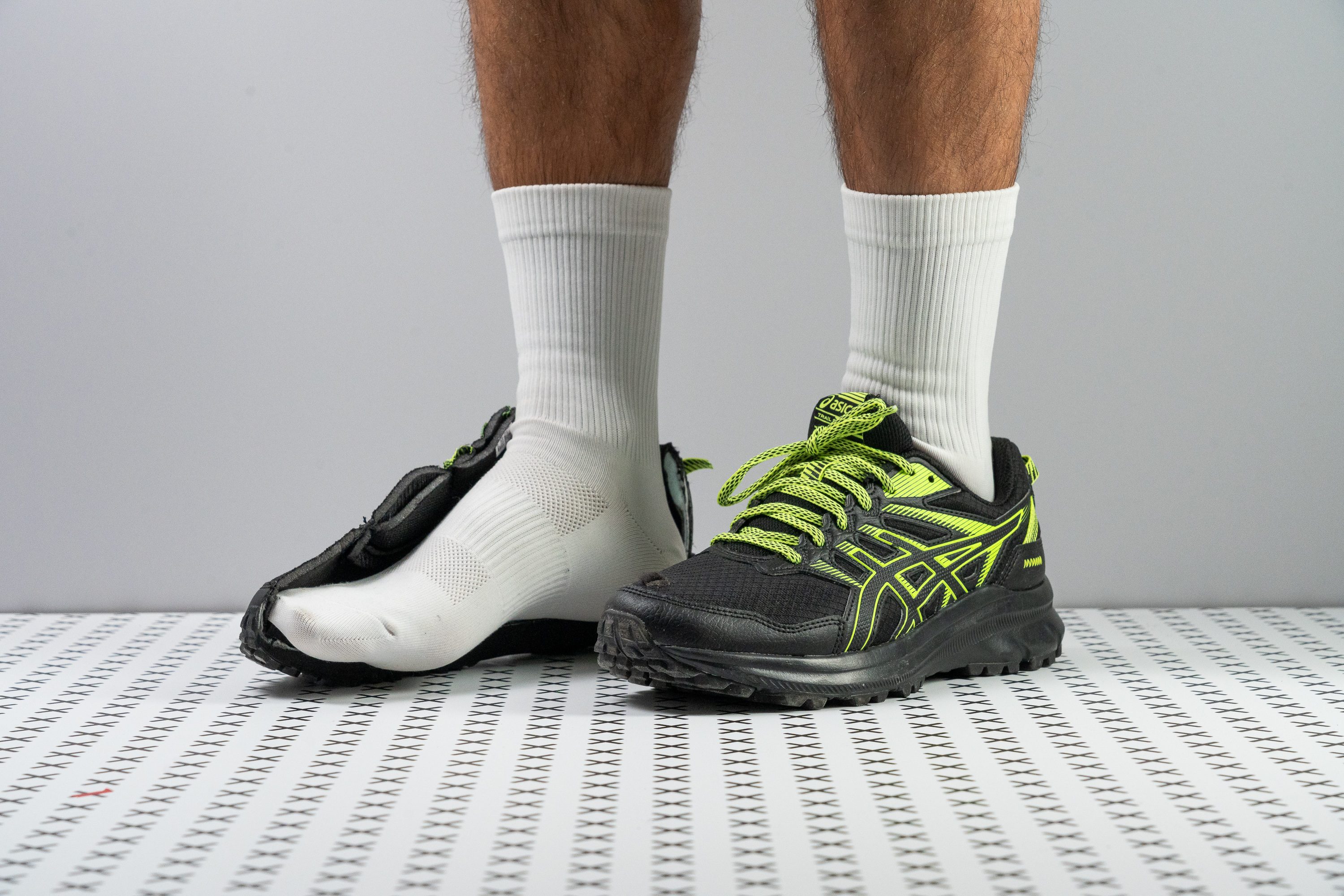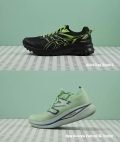Our verdict
Pros
- All-day support
- Durable
- Grippy on rugged and mountain trails
- Impressive heel lockdown
- For heavy runners
- Can double for hiking and walking
- Astonishingly CHEAP
Cons
- Narrow for wide feet
- Lacks responsiveness
- Heavy
Audience verdict
Comparison
The most similar running shoes compared
+ + Add a shoe | |||||
|---|---|---|---|---|---|
| Audience score | 83 Good! | 83 Good! | 74 Bad! | 86 Good! | |
| Price | $60 | $155 | $90 | $100 | |
| Trail terrain | Moderate | Moderate | Light | Light | |
| Arch support | Neutral | Neutral | Neutral | Neutral | |
| Weight lab Weight brand | 11.4 oz / 323g 11.4 oz / 323g | 9.6 oz / 271g 9.5 oz / 270g | 11 oz / 312g 11.5 oz / 326g | 9.9 oz / 282g 10.4 oz / 294.8g | |
| Drop lab Drop brand | 10.3 mm 10.0 mm | 8.9 mm 6.0 mm | 8.2 mm | 9.2 mm 8.0 mm | |
| Strike pattern | Heel | HeelMid/forefoot | HeelMid/forefoot | HeelMid/forefoot | |
| Size | True to size | Half size small | True to size | True to size | |
| Midsole softness | Balanced | Soft | Balanced | Balanced | |
| Difference in midsole softness in cold | Small | Normal | Small | Big | |
| Toebox durability | - | Very bad | Decent | Bad | |
| Heel padding durability | - | Bad | Bad | Bad | |
| Outsole durability | - | Decent | Good | Decent | |
| Breathability | Moderate | Moderate | Moderate | Moderate | |
| Width / fit | Narrow | Medium | Narrow | Medium | |
| Toebox width | Medium | Medium | Medium | Wide | |
| Stiffness | Stiff | Stiff | Stiff | Stiff | |
| Torsional rigidity | Stiff | Stiff | Moderate | Moderate | |
| Heel counter stiffness | Stiff | Stiff | Moderate | Stiff | |
| Lug depth | 4.2 mm | 3.4 mm | 2.9 mm | 2.7 mm | |
| Heel stack lab Heel stack brand | 32.8 mm | 29.3 mm 34.0 mm | 33.8 mm | 32.1 mm 30.0 mm | |
| Forefoot lab Forefoot brand | 22.5 mm | 20.4 mm 28.0 mm | 25.6 mm | 22.9 mm 22.0 mm | |
| Widths available | Normal | Normal | NormalWideX-Wide | Normal | |
| Season | All seasons | All seasons | All seasons | All seasons | |
| Removable insole | ✓ | ✓ | ✓ | ✓ | |
| Orthotic friendly | ✓ | ✓ | ✓ | ✓ | |
| Ranking | #270 Bottom 29% | #272 Bottom 28% | #372 Bottom 2% | #189 Top 50% | |
| Popularity | #337 Bottom 12% | #202 Bottom 47% | #321 Bottom 16% | #316 Bottom 17% |
Size and fit
Size
ASICS Trail Scout 2 fits true to size (17 votes).
Who should buy the ASICS Trail Scout 2
We believe that the ASICS Trail Scout 2 is a trail shoe that best fits runners who are looking for a:
- budget shoe for off-road adventures
- supportive trail running shoe for mellow days
- trail shoe that can double as a light hiking and walking shoe
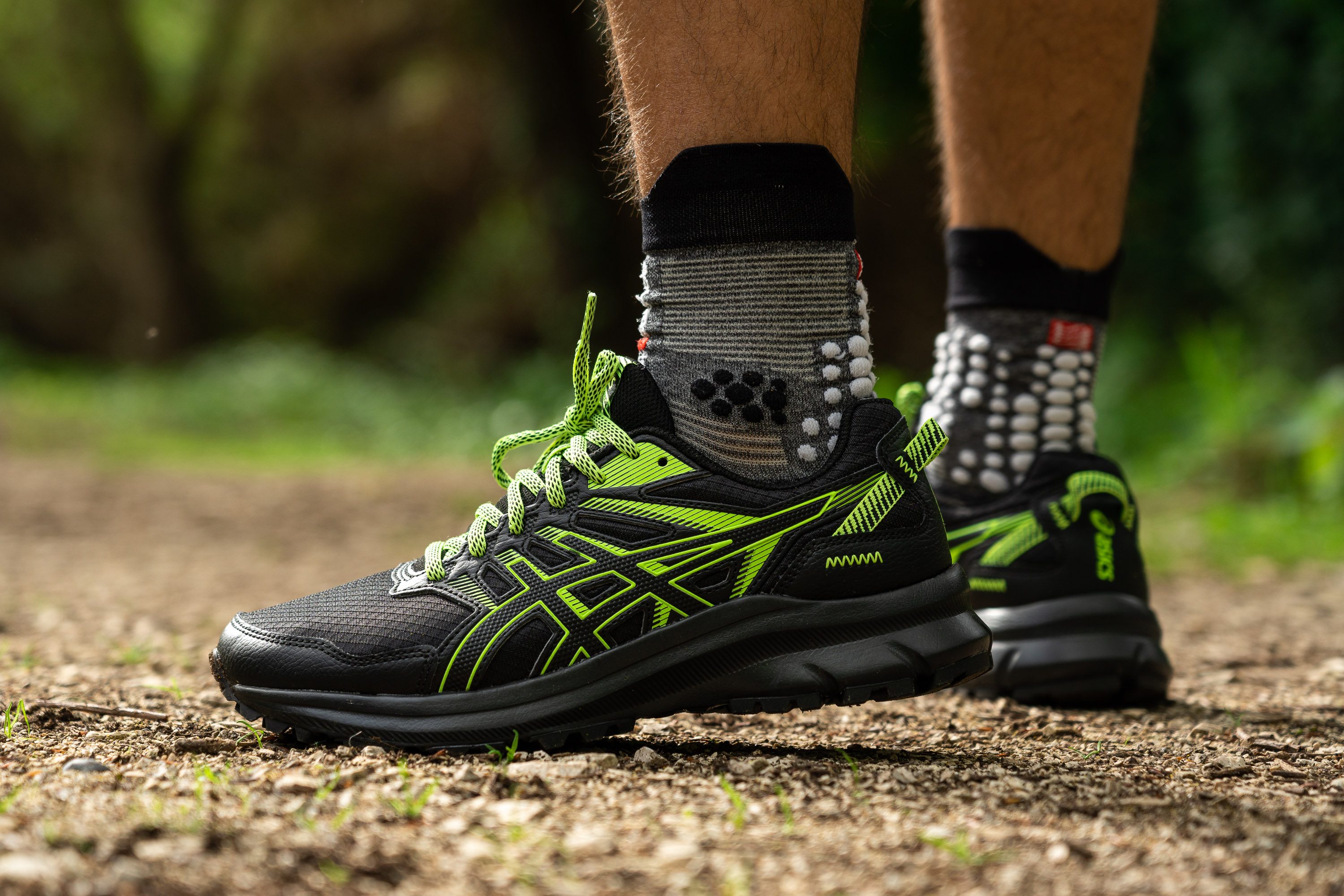
Who should not buy it
If you're seeking luxury or a premium experience in the mountains, we feel that this shoe isn't for you. It's a budget-friendly, all-purpose shoe without a fancy midsole, ultra-padded upper, or cutting-edge technologies.
For those features, our recommendation is checking out the carbon-plated Saucony Endorphin Edge or the Hoka Challenger 7.
Trail Scout 2 vs. 1
The second version of the Trail Scout from ASICS only meets one significant update. The outsole now has a redesigned pattern, and it provides anchored steps on uneven terrains. The rest of the shoe's construction takes after its predecessor.
A built-to-last upper
Upon closer inspection of the upper, we discovered that ASICS used thick and durable materials in the Trail Scout 2. It features an abrasion-resistant mesh and multiple layers of sturdy synthetic leather.[/fact_check]
Of course, breathability now is a concern. The more layers there are, the more airflow is compromised.
Luckily, the Japanese brand did a great job by incorporating thinner layers in the upper's top section to enhance ventilation.
The light test confirmed ASICS' strategy. While it's not the most breathable shoe out there in the trails—especially in this black colorway which can be too hot for summer—it still performs OK. With a breathability score of 3 out of 5, it's on par with the average trail shoe.
Dull ride
There's not much bounce from the Trail Scout 2. We even found it a bit rigid for our liking despite ASICS' attempt to make the shoe softer. If you're in for a more forgiving and lively ride, we recommend going for the Nike Wildhorse 8 instead.
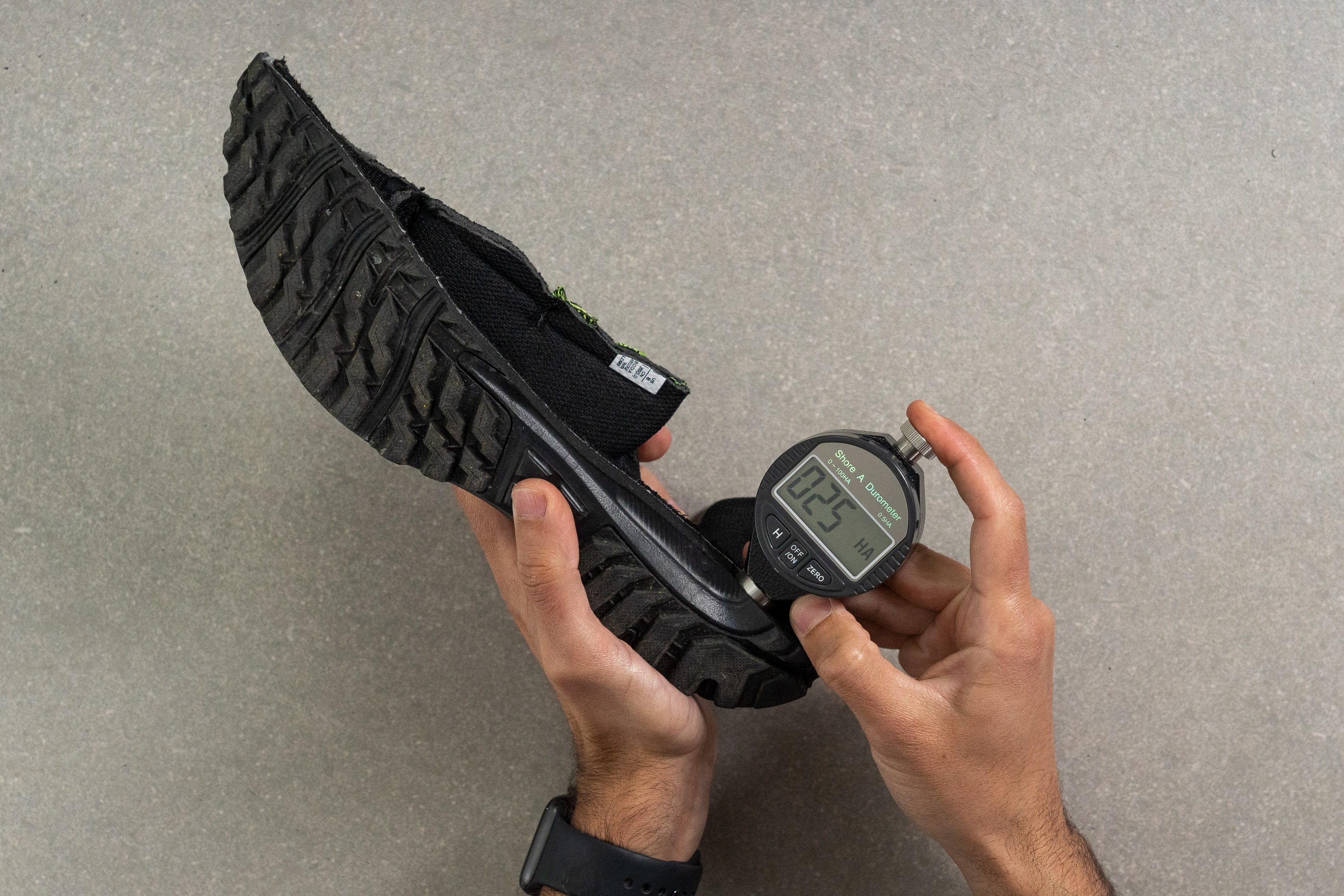
We tested the foam and found it to have a hardness rating of 25.5 HA, which is 7% softer than average. This means that the shoe provides a moderately soft feel, but don't anticipate a lot of bounce from the EVA-based foam.
Based on our manual assessment, we gave this shoe two "relatively rigid" scores: 3 out of 5 for longitudinal flexibility and 4 out of 5 for torsional flexibility. This must be the main reason why we perceived the shoe as rigid.
Then we did our classic bending test, where we measured the force required to bend the shoe to a 90-degree angle. And we discovered that this ASICS model is 15% more flexible than the average trail shoe.
Having said that, it's crucial to take into account that the median calculation includes incredibly stiff carbon-plated trail shoes. Therefore, it was not surprising at all when we excluded those shoes from the comparison and discovered that the Trail Scout 2, once again, falls on the stiffer side of the spectrum.
Painless and stable steps
We found this ASICS shoe to be quite supportive for all-day wear too! It kept our strides steady and totally free from foot fatigue and strain.
This is also the same reason why we think heavy/large runners will prefer this shoe.
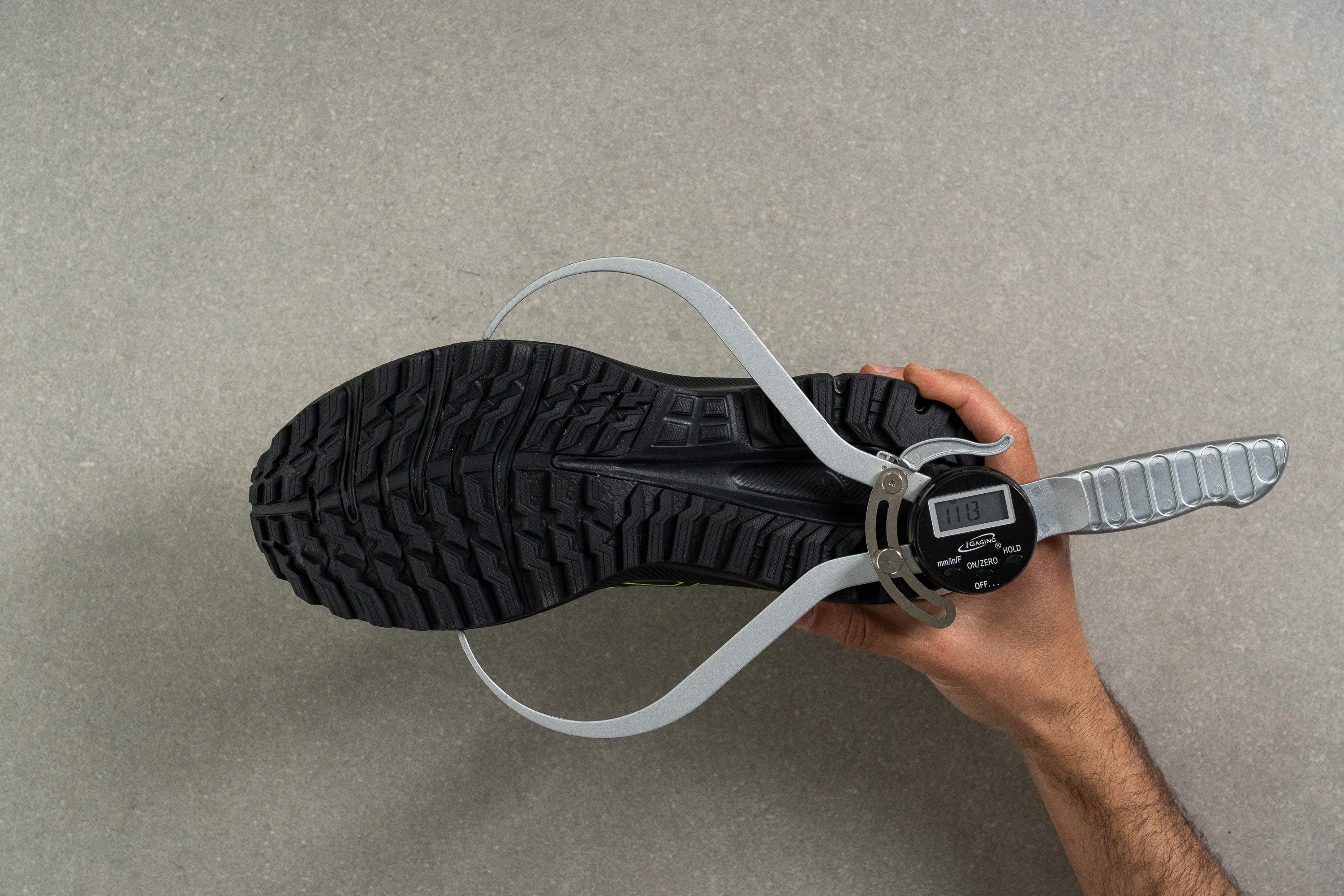
Measuring the shoe's base with a caliper, we got 111.3 mm in the forefoot and 89.8 mm in the heel. That's exactly the same as the average of trail running shoes but in this case, it's a benefit.
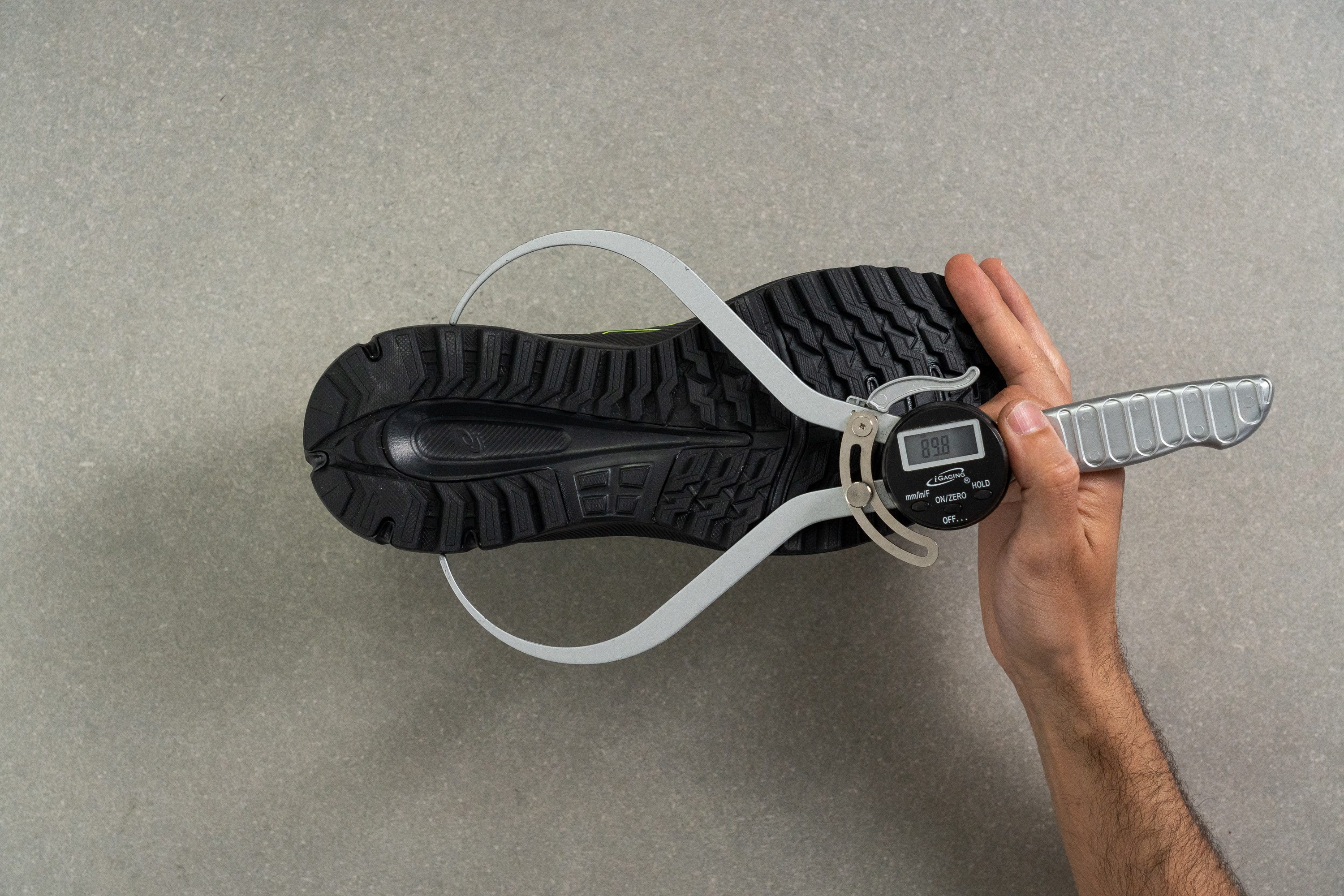
The EVA-based midsole, in conjunction with the outsole, provides a stack height configuration of 22.5/32.8 mm.
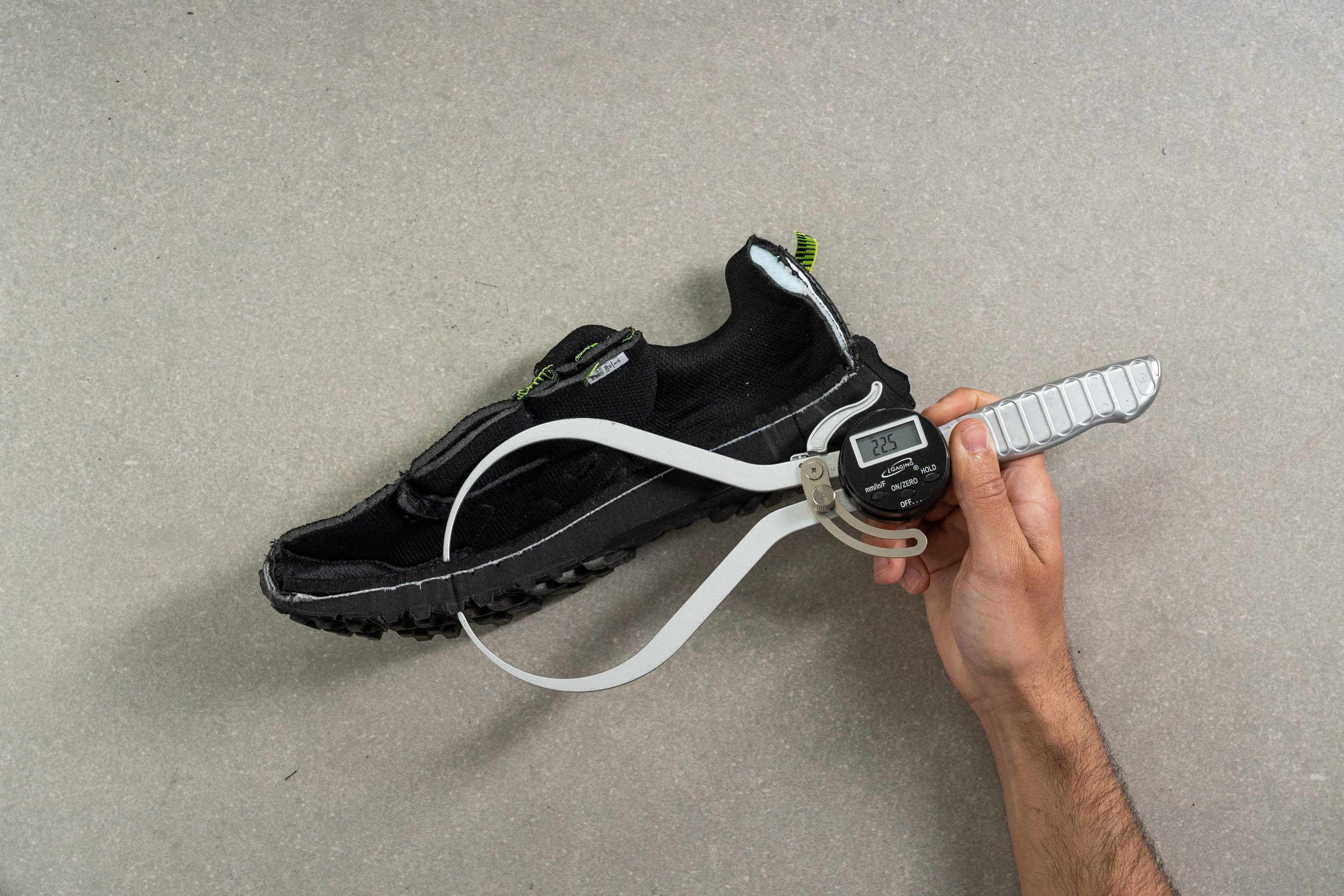
This may not be sufficient for your typical Sunday long run, particularly if you strike with the forefoot. Yet, it should be enough cushion for the majority of runs.

Finally, there's absolutely zero rocking action in this shoe, and that's exactly what we were expecting.
It's almost laughable how this shoe refuses to balance when it starts rolling towards the midfoot!
Winter delight!
Having analyzed 200+ shoes in our lab, we discovered a clear correlation that shows cheaper foams becoming bricks in cold temperatures. To our amazement, the Trail Scout 2 performed at a high level in this regard.
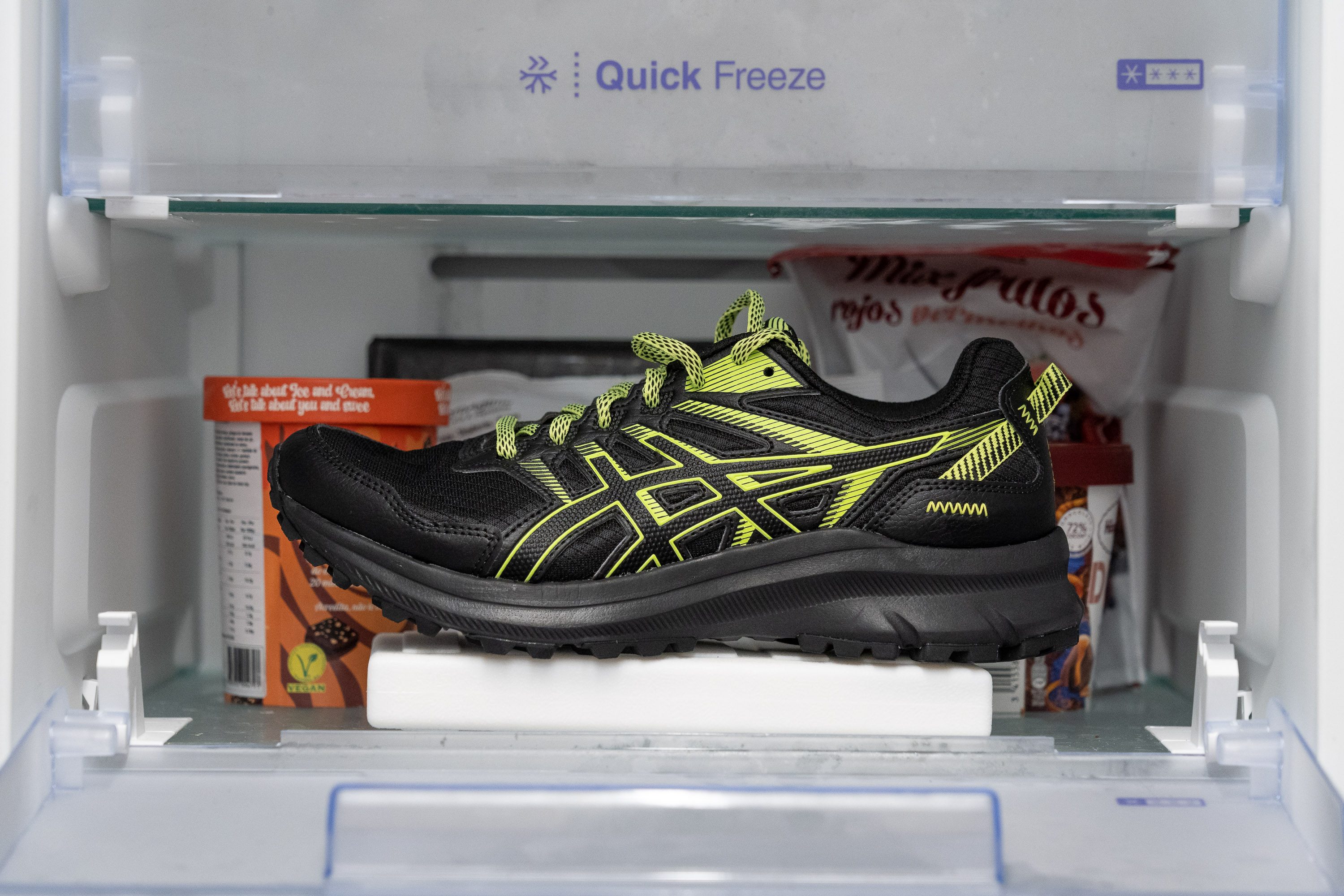
This shoe really surprised us, becoming only 13.7% firmer and 31.8% stiffer after spending 20 minutes in our freezer.
This is significantly lower compared to shoes that cost twice or thrice as much, such as the Salomon Ultra Glide 2 (81.9%/31.8%) or the Nike Wildhorse 8 (41.3%/37.2%).
The ASICS Trail Scout 2 outsole is durable and clings like claws
We found that the shoe grips on mountain terrains and rugged trail surfaces very well. We've had zero slips or missteps.
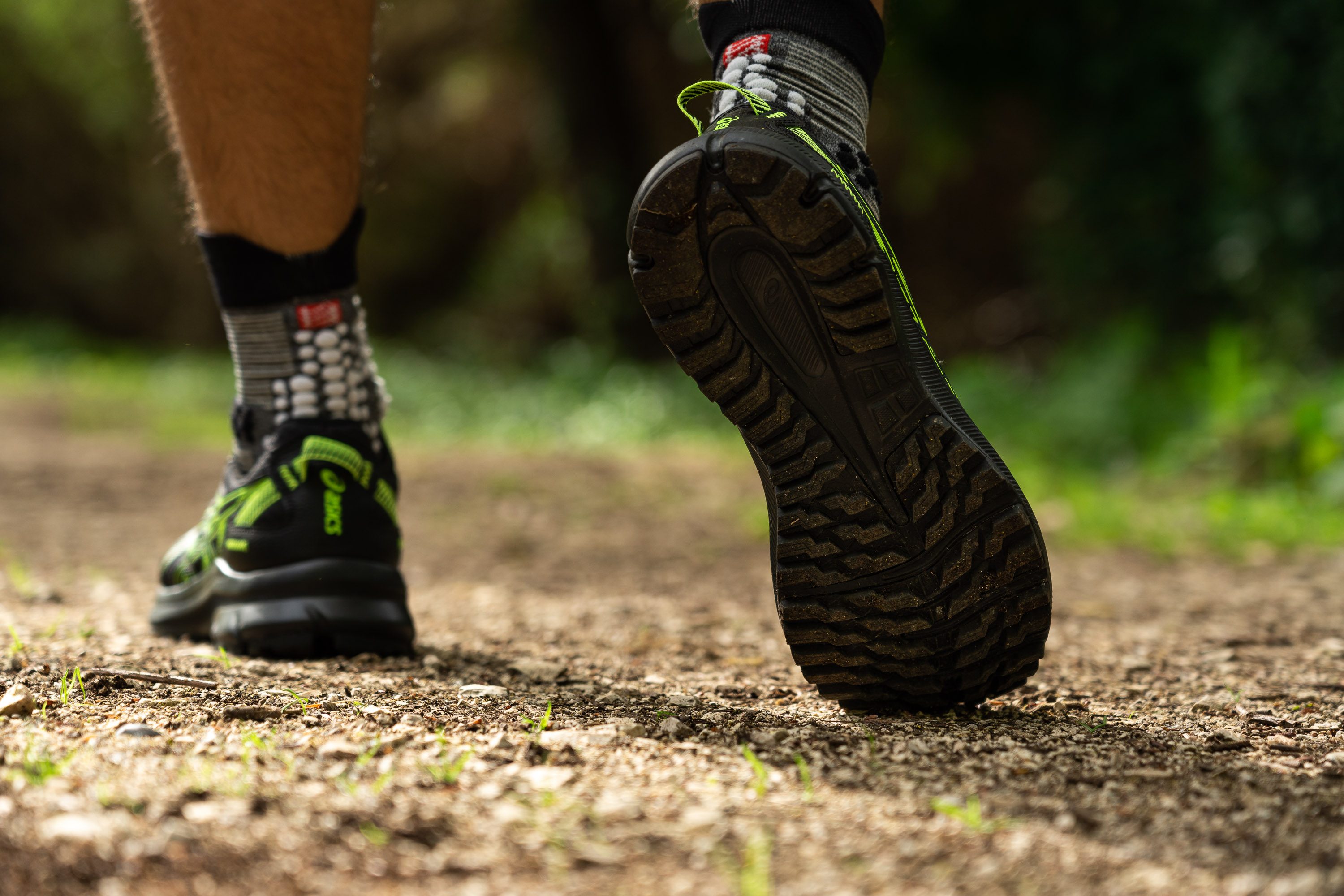
The outsole rubber appears to be quite abrasion-resistant too. ASICS made a deliberate choice to use a rubber compound that is slightly firmer than the average—87.8 HC of hardness—aiming to strike a balance between durability and grip, with a slight emphasis on durability.
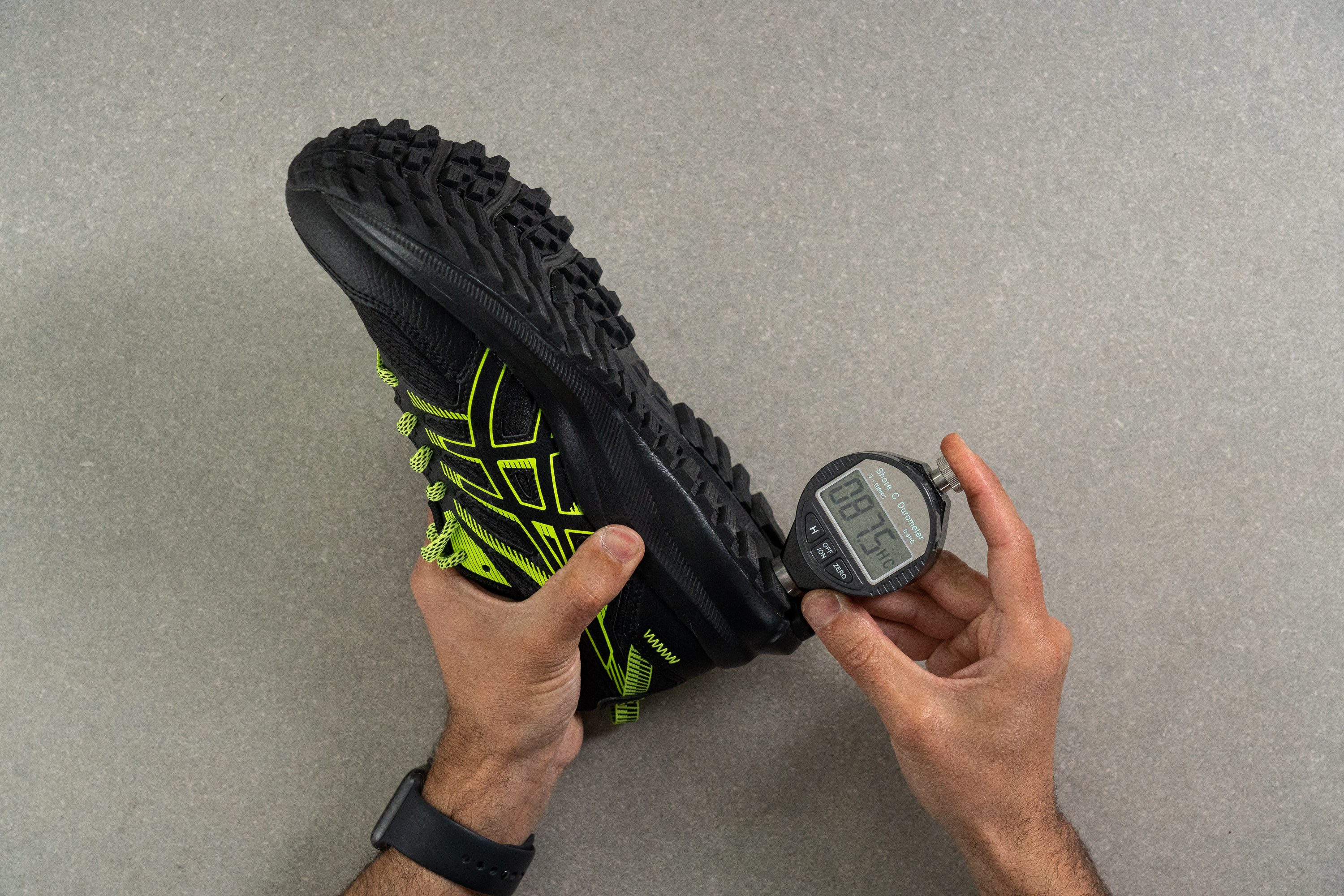
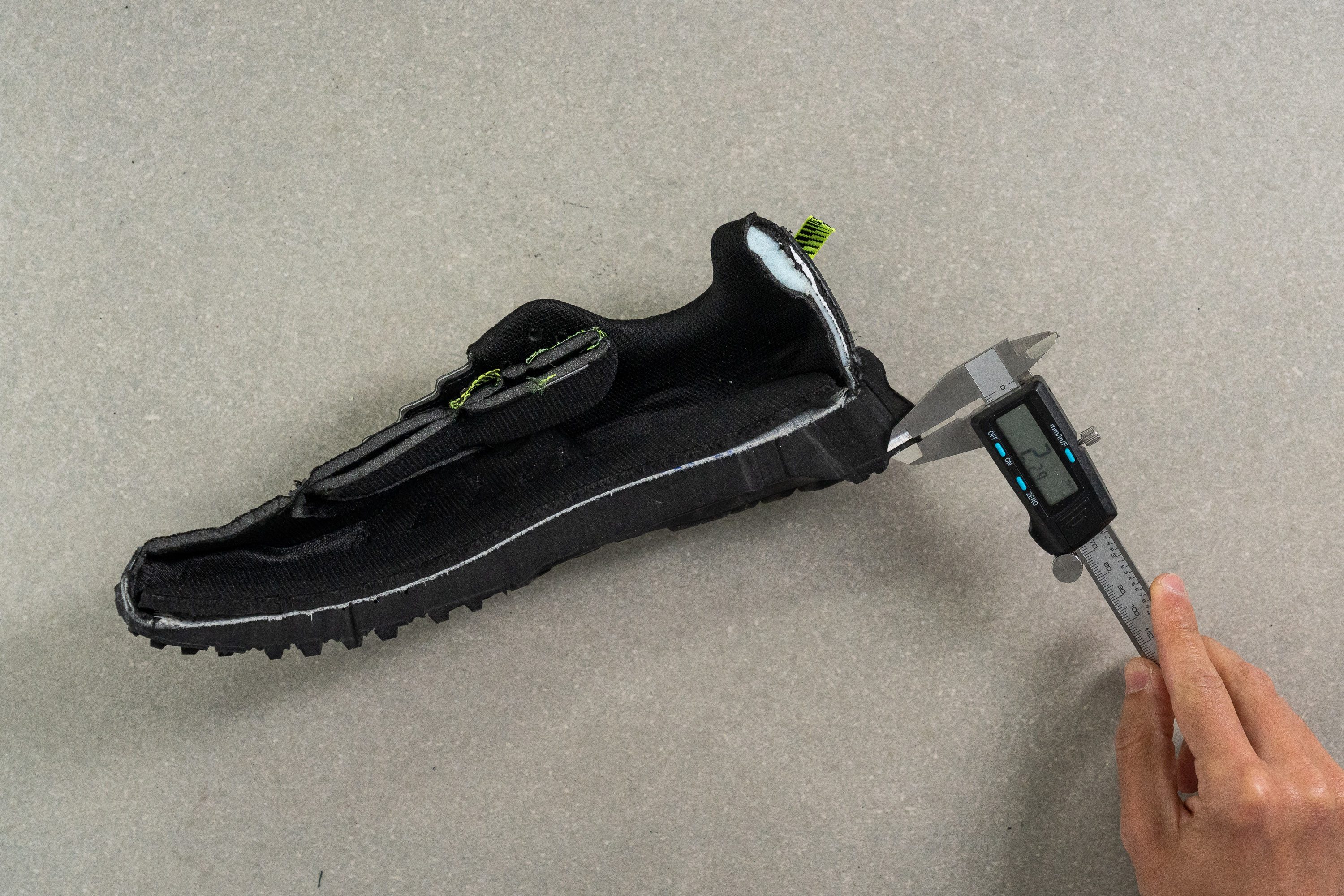
A funny thing about running shoes is that customers hope that the cheaper shoes will outlast the more expensive ones. That's why ASICS needed this model to be super durable, so they went ahead and made the lugs and rubber thicker than usual.
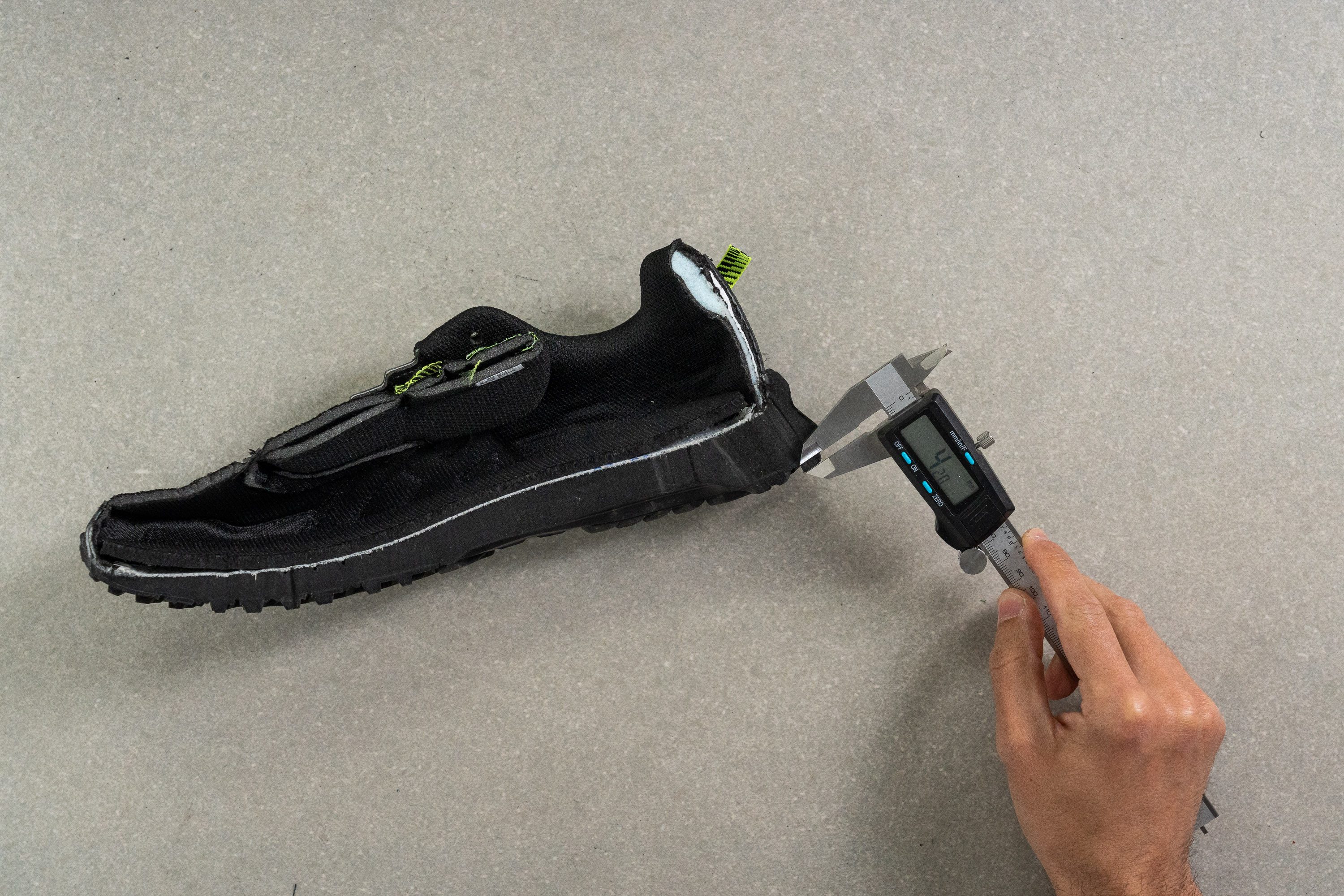
How thick? Well, let's do a little comparison...
| Shoe | Outsole (mm) | Lugs (mm) | Total (mm) |
| ASICS Trail Scout 2 | 2.3 | 4.2 | 6.5 |
| Salomon Ultra Glide 2 | 1.6 | 2.8 | 4.4 |
| Nike Wildhorse 8 | 1.7 | 3.5 | 5.2 |
| Hoka Challenger 7 | 1.7 | 3.1 | 4.8 |
| Kailas Fuga YAO | 1.8 | 1.7 | 3.5 |
| Saucony Xodus Ultra | 2.1 | 3.8 | 5.9 |
With 6.5-mm-thick pure hard rubber, it's difficult to imagine this outsole getting destroyed with anything less than 500 miles.
Heel clutch is A-OK!
Thanks to the shoe's internal heel counter, the Trail Scout 2 has a supportive heel lockdown and we awarded it 5 out of 5 in our heel stiffness test. This prevents slips to inspire confidence during the run.
If you're a fan of soft heel counters, this shoe may not be the best choice for you. Pick the New Balance Fresh Foam Hierro v7 instead.
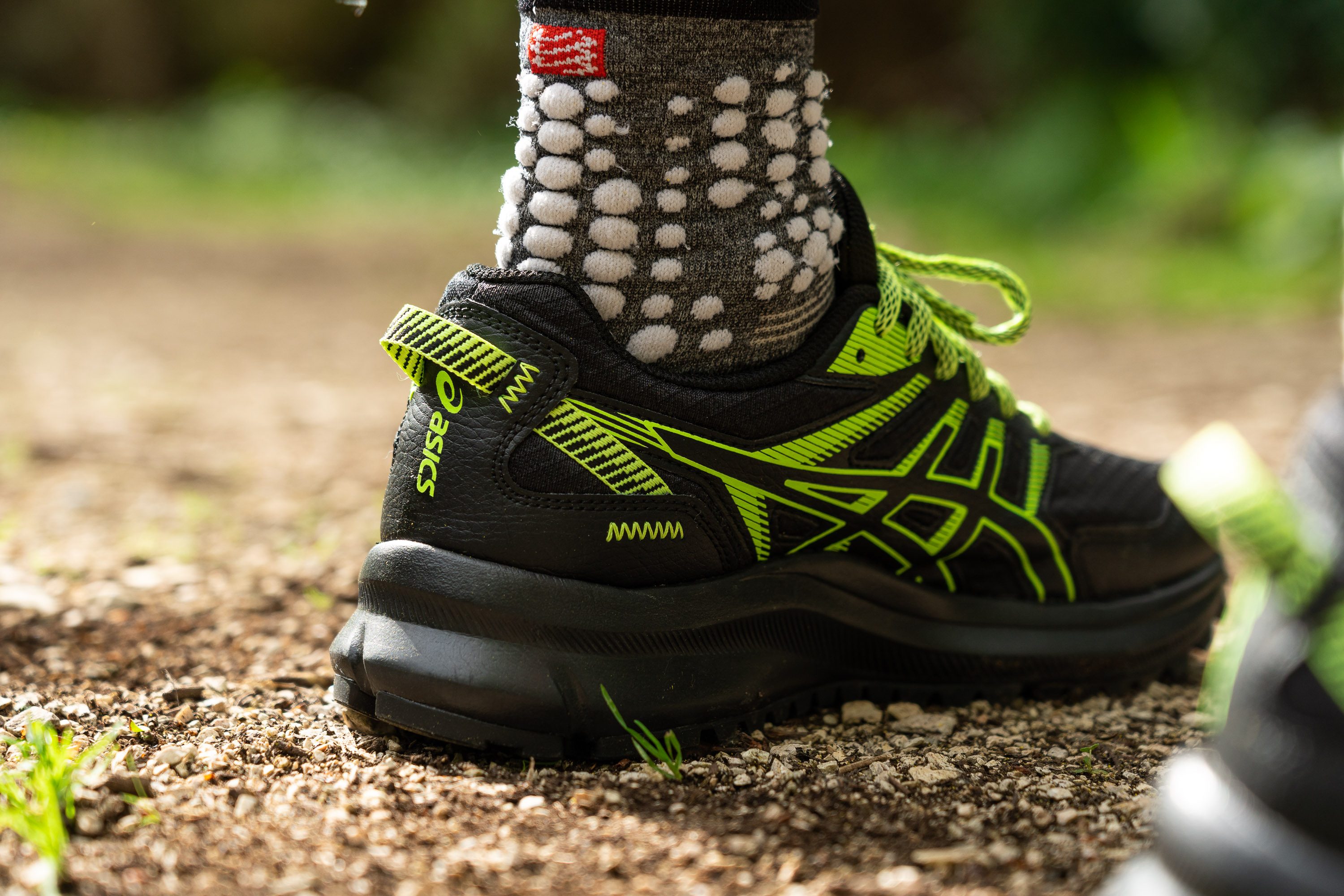
Also in the heel area, you'll find a convenient finger loop pull tab, which is a feature not present in every trail shoe. This cool addition makes it easier to slide your foot into the shoe, especially when the upper is as sturdy as this one.
Toebox is not wide-feet-friendly
From our experience and measurements, the shoe's toebox is just the right fit for those with narrow to medium-width feet. However, we anticipate that broad-footed runners will find the shoe constricting.
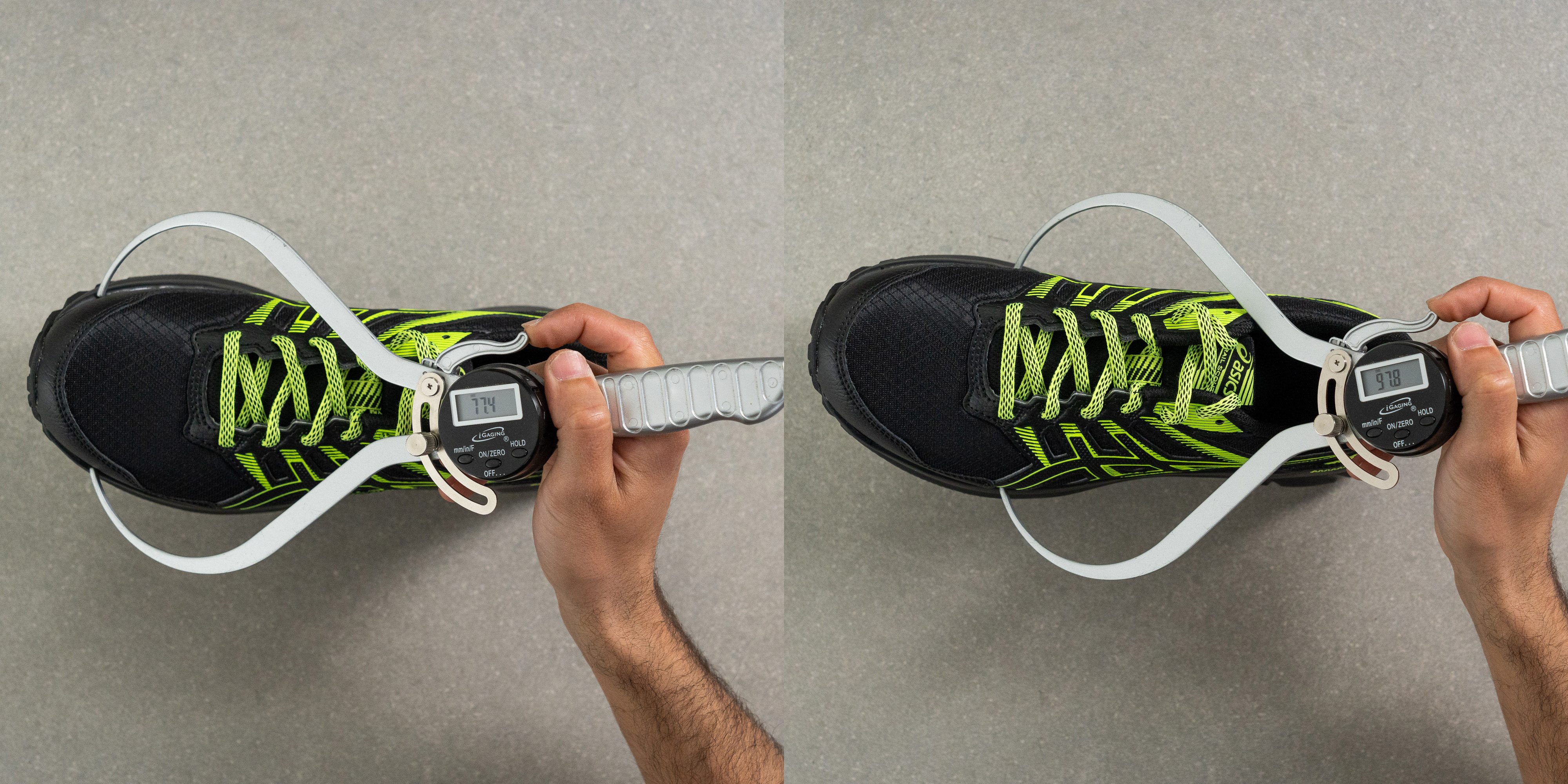
We measured the maximum width point of the toebox at 97.8 mm and the big toe area at 77.4 mm. This is almost identical to the average trail shoe's measurements.
But the good news is that the ASICS Trail Scout 2 comes in extra wide too for those who need more real estate.
Tongue troubles
The tongue on this shoe has 2.5 mm more padding than your typical trail shoe. That's amazing, but here's the catch—it's not attached to the sides.
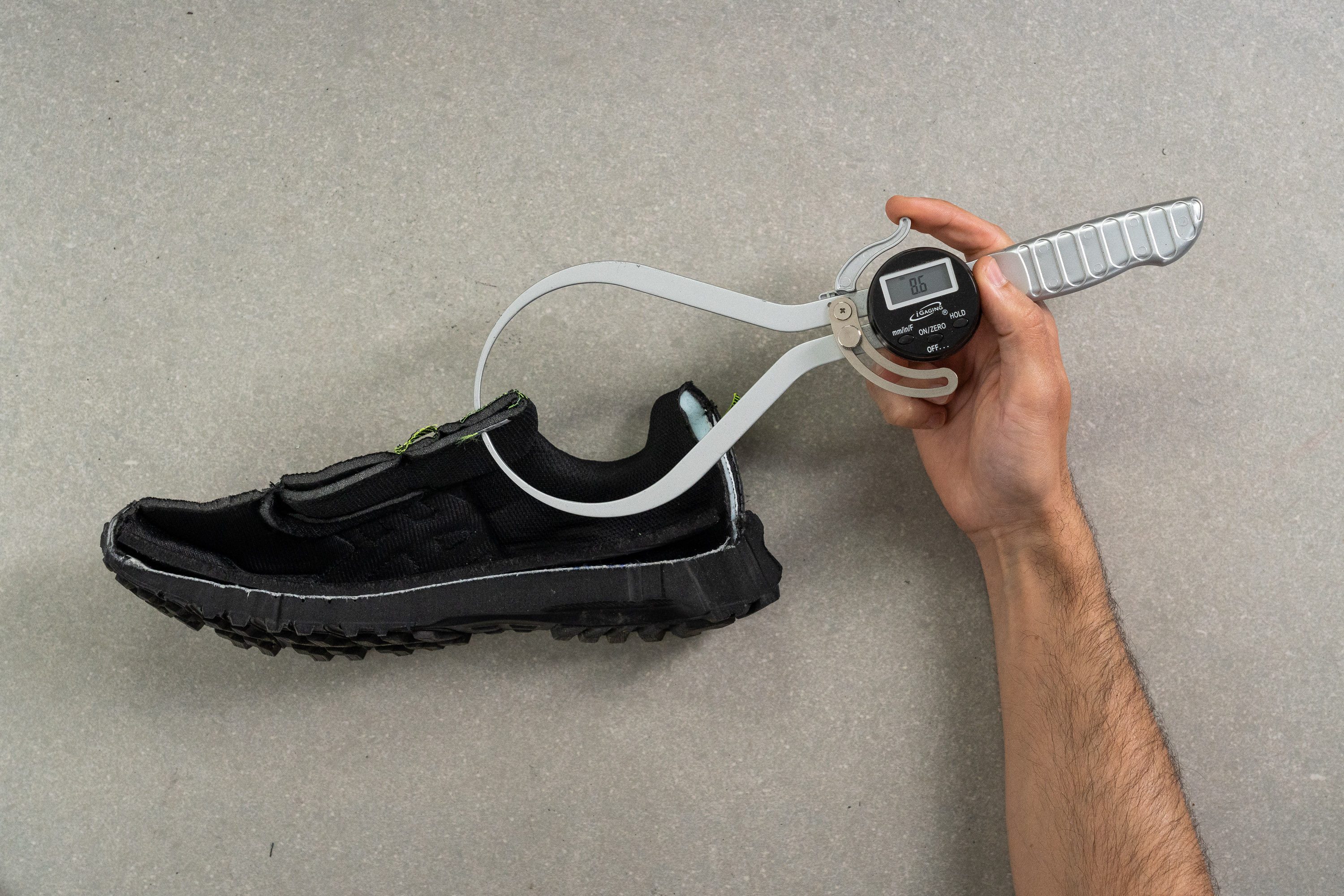
That means the tongue moves around more than we'd prefer, and here's another bummer—it doesn't keep out little debris or rocks from sneaking into your shoe during your runs.
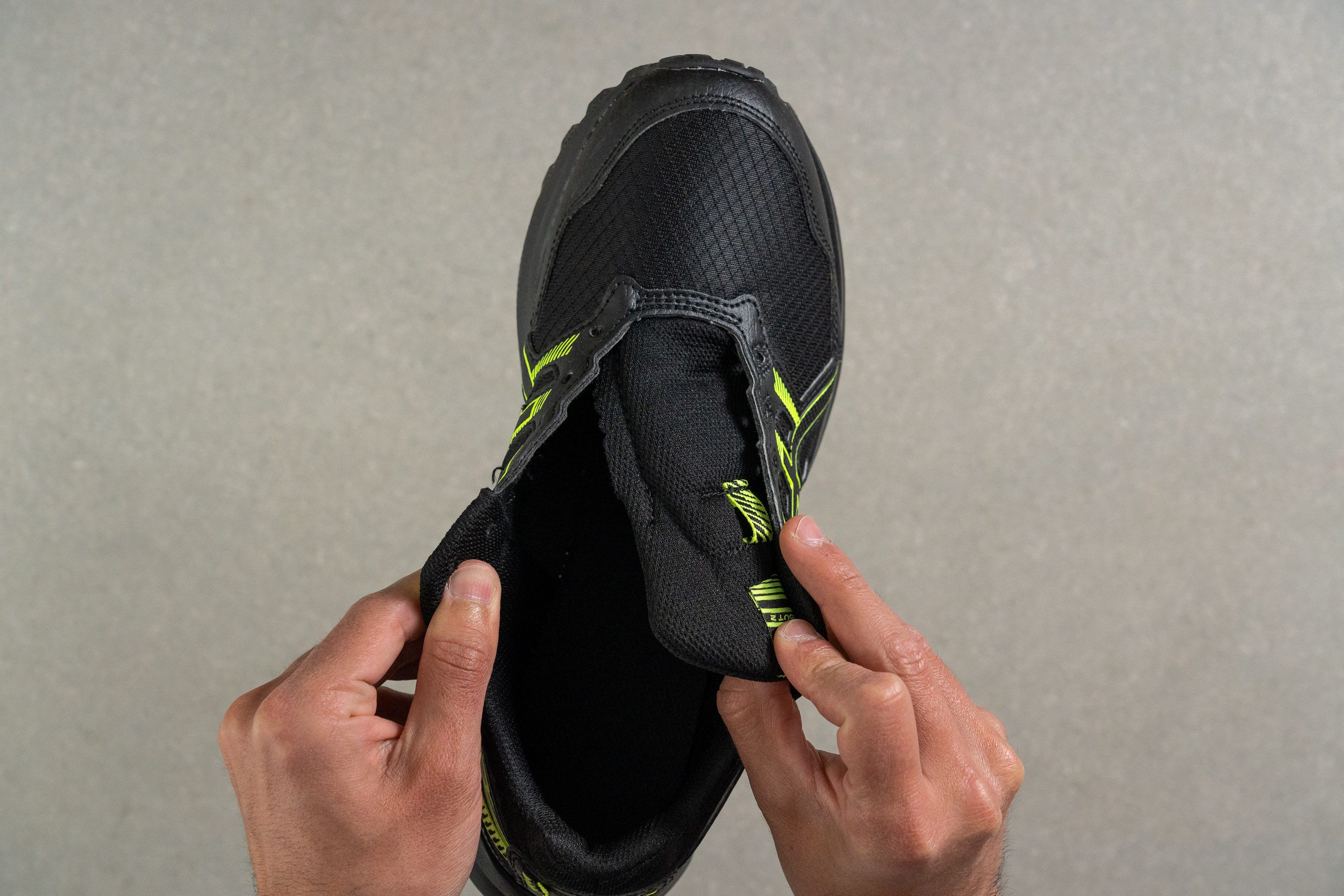
That's why most trail shoes rock a full or semi-gusseted tongue—but hey, you can't have it all for $60, right? On average, trail shoes retail for $147.
Tips the scales
The Trail Scout 2 comes in at 11.4 oz (323g) in a men's US size 9. That's a whole ounce heavier than trail running shoes on average and was definitely felt the moment we tried picking up the pace or going a longer distance.
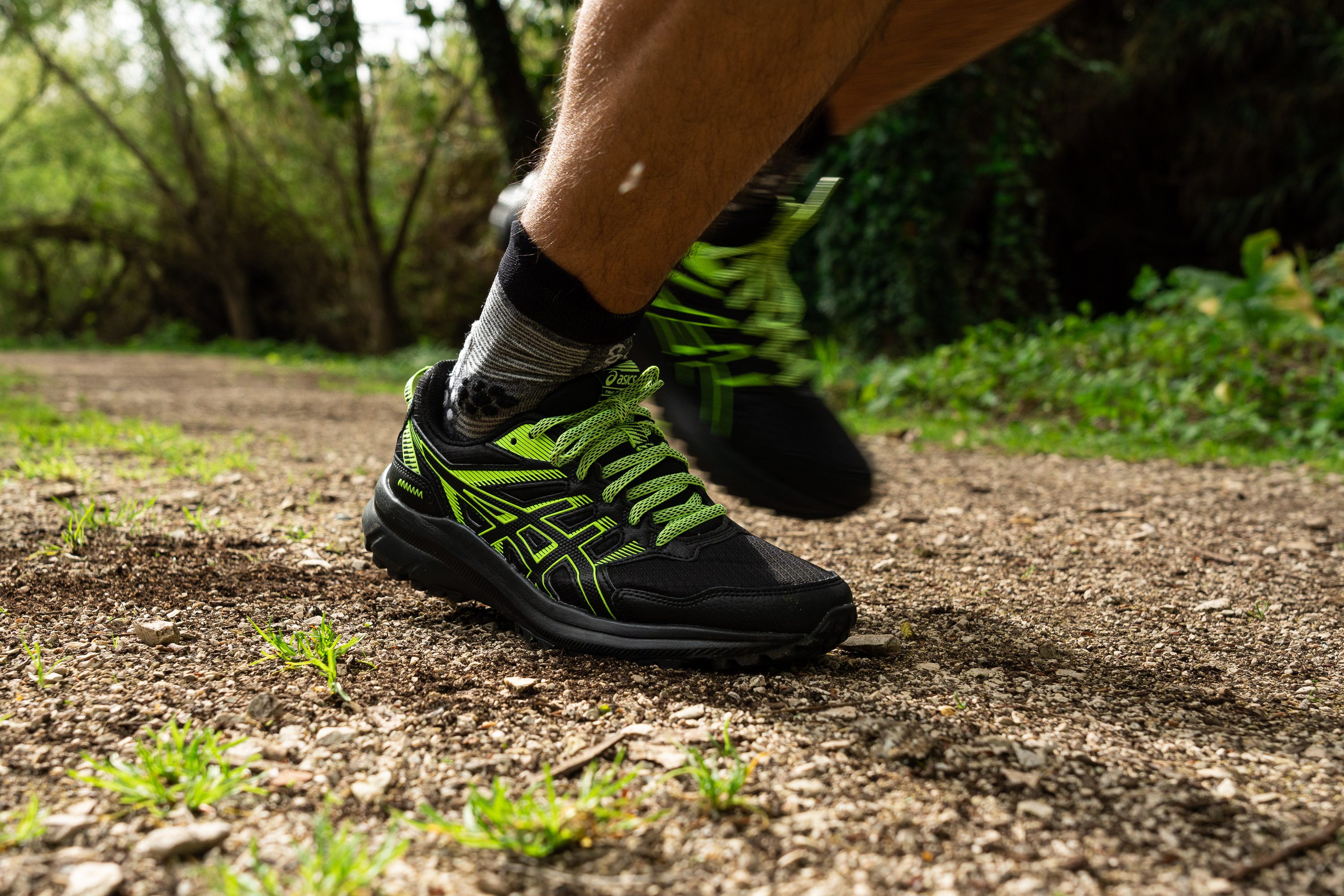
But we do understand that for $60, we can't have it all.

